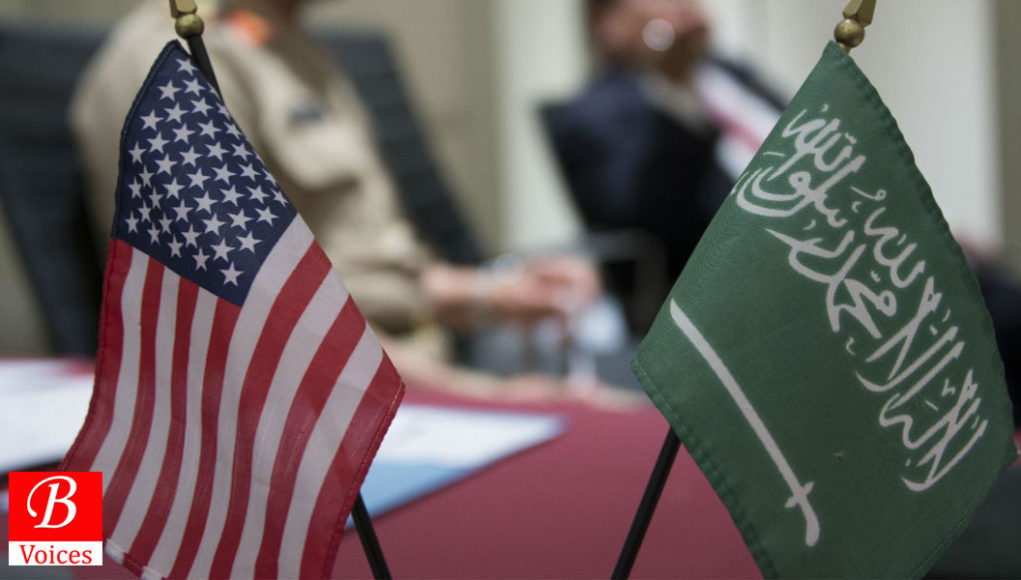 Saddam Shah
Saddam Shah
The US has been rejoicing in better relations with KSA since last seven decades. States-Friendship; as always based on common interest which is collective, or at least, having somehow alike path for diverse destinies in interdependent international relations.
US in the ‘Truman’s doctrine’ had to hold the USSR’s expansion of communist ideology through its rigid ‘Wahhabi perspective of Islam’ in the Middle East from the beginning of cold war era.
To halt ‘Russian interest of Communism’, Capitalism was essential for the state interest of US, though more exaggerated, Saudi Arab was picked as Bulwark by US against USSR.
United States boomed its ties with the monarchy lead state of Saudi Arab, to sustain its benefits from the ‘Global Monetary System’, when sufficient Arab’s oil reserves took the place of rapid depleting gold reserves of US, as economic-instrument, to have its dominance in international political economy, and to deal with threat of ‘Oil Embargo’, exploited as weapon against US and other western powers in 1973 by Riyadh, and thus replaced ‘Bretton Wood system’ by ‘Petrodollar system’, to save the declining value of internationally used currency of ‘US Dollar’.
The US was extremely opposed to Iran’s revolution, as after losing its puppet regime in 1979, it has not been close tie-in with Iran. Since, Iran has been laid to so-called ‘Isolationism’ by numerous sanctions, particularly on its nuclear arm project and economic activities.
US then extended its connections further with Iran’s rivalry country Saudi Arab, for countering regional emerging power, which has been US strategic policy in all regions of the world since world war II, to maintain its sphere of influence.
One another undiscussed rationale is also that KSA is the representative state for Muslim countries due to its sacred places, and being a birth place of Islam.
Though there is extreme anti-US sentiment in minds of fundamentalist Muslims, i.e. Saudi citizen Osama and fifteen Saudis involved in New York horrendous incident of 2001. But that has never been brought to policy level of Muslim countries, and KSA, being the most significant cleric of Islam, has symbiotic correlations with Washington, and hence such ‘Anti-US sentiments’ have been countered with ease on state level.
US experts examined so many pitfalls of Saudi dynasty, including Human Rights violation, particularly Women Rights, its Wahhabi school of Islam that ultimately was like uncontrolled nuclear reaction and responsible for Al Qaeda and ISIS like entities, and its anti-democratic doctrines, but Washington couldn’t sort out any better ally for US in the Middle East, because of multiple compulsions.
US has different flavors of politicians, diplomats and policy makers, it just fits everyone on right place, and at right time, whenever required, i.e. Anti-Saudi Friendship and Pro-Saudi Friendship.
Obama administration tried to challenge the historical practice of US towards Middle East through its colorful lobbying groups to confuse the diplomate of other states, and after US-Iran Nuclear deal, and the JASTA act were the actions demanded by anti-Saudi lobby in congress.
This really baffled the Kingdom, and that is why Saudi-led 34 countries of Islamic Military Alliance to Fight Terrorism (IMAFT) was announced in the last month of 2015, now extended to 42 countries, and the logic may be that previous president also wanted to defeat the ISIS like non-state actors, by empowering the indigenous forces without being involved in the battleground themselves unlike in Afghanistan and Iraq wars, and at the same time, it can also be Saudi-wish to militarily enrich itself, and be less dependent on others’ ‘protecting umbrellas’.
US presidential election in 2016, was not less than a major jolt, for almost every country of the world. It was estimated to be a real paradigm-shift, and that is rather more exaggeration.
Trump’s twitter handle was advising Obama to stay out of Syria since 2013, and now Trump’s office is convincing him to get into Syria.
Trump took a U-Turn when sat on ‘Super Chair’ in white palace, unlike in his campaign for election, regarding KSA, to be paid more for their security, and was saying Saudis have nothing but ‘Money’, which he may not know, ‘Money may not buy everything, but can buy many things’. And its geo-strategic location cannot be undermined in front of Moscow and Tehran.
ISIL is, these days, considered a major threat for US security, even by analysts along with the practitioners, but that also raises numerous other questions regarding ‘US weapon market’, and especially about the ‘Value of US Dollar’, with draining KSA oil reserves in petrodollar system, and some predicted threat from Kingdom hegemony in the region, as Saudi regime reminded to use at the time of JASTA Bill, and its immense will of US intervention directly in Syria and Iraq, which means explicitly against Iran.
Obama tried Tehran, despite anger from Riyadh, as a stability factor in Middle East, but Trump confirmed Tehran to be a worse pick, and Riyadh as relatively better
Now US is facing the politically and militarily growing role of Russia in Middle East, and ‘No choice’ to make Iran as a better alternative ally to Saudi Arab. Trump meeting with Saudi Deputy Crown in last month indicates much about restoration of Riyadh’s support. Thus, it has finally found a better chance to intervene by fifty-nine airstrikes on one of Assad’s airbases.
On one side US State department has stated that they had informed the Russian before, but Russia condemns the attacks as it claims only few of the ‘Tomahawks missiles’ smacked the target, and voices are heard from Iran, professing that they had intelligence reports and had already shifted the major items before attacks of more than one airbase.
No matter, how much true these are? But US has initiated its actions with first airstrike, though affirmed as limited and anti-chemical weapon strike. But now, it must need Saudi support at all cost, which they have been already ready to provide, as given in Iraq-Kuwait war.
Disclaimer: Views expressed in this article are those of the author and Balochistan Voices not necessarily agrees with them.
Share your comments!








